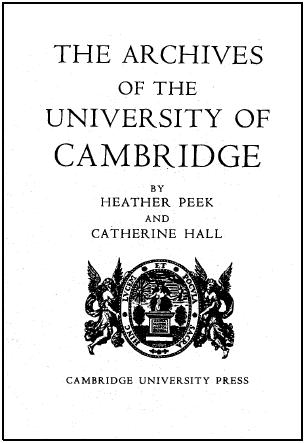Gordon Wright
Heather E. Peek was Keeper of the Cambridge University Archives when they were still housed, in very cramped quarters, at the Old Schools, the historic centre of the University. An excellent scholar, but no politician, she strenuously resisted their removal in 1972 to their present home in Cambridge University Library.
The central administration desperately needed more space, and the decision had been made to move the archives to Sir Giles Gilbert Scott’s 1934 building well out, “to the west of the river and Queens’ Road. Peek opposed the move, especially on the grounds that, at a time of profound change, it was essential to look back as well as forward, so the archives should be close at hand for consultation. She was doomed to lose the argument.
In retrospect, whatever the merits of the case, a traditionalist might sourly reflect that in any ancient institution the present-day management must be tempted to think its history valuable only for the “wooing” of potential benefactors, whilst in all other respects a confounded nuisance. We forget at our peril that the word muniments, now meaning just records, documents, originally meant “defences”.
Heather Elinor Peek was born in the Rectory at Drewsteignton, Devon, in 1916, the elder of the two children of the Rector – whose father, too, had been Rector. It mattered much to her that the Peeks had deep roots in Devon, as farmers near Kingsbridge who had been armigerous since 1832.
As daughter of a rector, having a rural upbringing and being educated at Poltimore College near Exeter and also privately, she grew up with uncomplicated values and beliefs which she never abandoned. From a sickly 4 1b 4 oz breech baby she turned into a vigorous, athletic swimmer, and an organiser of tennis parties. However at 15 a serious illness, never satisfactorily diagnosed, struck that turned l’allegra into la penserosa and was to have far-reaching effects.
Heather and her sister Veronica were both academically able, but the family were not well-to-do, and opportunities had not yet been transformed by the 1944 Butler Education Act, so each had to make her own way.

When the Second World War came Heather was 23, still without a degree. On account of leg trouble she was deemed unfit for the Services. At home, she did much work towards an external London degree, before discovering that it was still possible to apply for Oxford entrance. She entered St Hilda’s in 1942 and, largely at her own expense, read Modern History graduating B.A. in 1946. It was a bitter disappointment that despite all her efforts she did not get a good degree: she was clearly still exhausted by the illness of a decade earlier.
A variety of jobs in “reserved occupations” – teaching at St Michael’s, East Grinstead (an Anglican convent), acting as Vice-Warden and Librarian at Ashburne Hall, Manchester University and freelancing for the Place Names Society and the Public Record Office – led in due course to her appointment in 1955 as Deputy Keeper of the University Archives at Cambridge, and incorporation as M.A., with membership of Girton College.
Three years later she was appointed Keeper of the Archives, a just recognition of her devoted care of the archives, of her unstinting help to many enquirers, and also of her own researches which led to the publication, in co-authorslup with Catherine P. Hall, of a book, The Archives of the University of Cambridge: an historical introduction (1962).
Elsewhere in Cambridge, she gave good support for many years to this Society, “C.U.H.A.G.S.”, and she was one of the four editors of The Cambridge Armorial (1985). Many members of the society over the years, had collected material: Peek’s very important contribution was to the longish historical introduction, and to the chapters on the university and the Regius Professors, all heavily dependent upon the rich material in the university archives. She was an honorary vice-president of our society.
In 1977 she took somewhat early retirement, moving back to Devon to be near her sister and their roots, and also to be able the better to work up her voluminous notes on the church at Drewsteignton. Increasing ill-health, aggravated by frightening experiences with burglars and conmen, made her last years empty and unhappy, so her death came as a release. Her final resting-place, beside her parents’, is literally across the road from her place of birth.
In her Cambridge years, and after, Heather Peek appeared as an old-fashioned lady, from a bygone era, who never came to terms with present-day mores and manners, and was thus a constant reminder to us that not all change is progress.
Return to:
Contact Officers of the Society by e-mail.
Cambridge University Heraldic and Genealogical Society